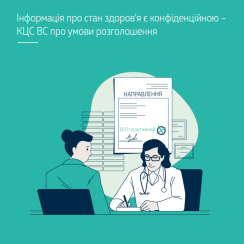Contact center of the Ukrainian Judiciary 044 207-35-46

A neuropathologist issued a referral to a psychiatrist in the name of the plaintiff to her husband. The referral, in particular, contained information about the woman's HIV-positive status, therefore, in the statement of claim against the neuropathologist and the medical institution where the doctor works, the plaintiff asked to recognize such actions as illegal and to compensate for the moral damage caused.
The woman pointed out that she had not given her consent to the disclosure of the diagnosis, which deprived her of the ability to communicate freely with the children, as the husband believed that HIV-positive status posed a threat to the children.
The court of first instance, whose decision was upheld by the court of appeal, dismissed the claim, since the man had previously been aware of the plaintiff's diagnosis, the neuropathologist copied the relevant information to the referral from the initial documentation provided by the plaintiff's husband - MRI results, since she considered this information professionally necessary for a psychiatrist.
The Civil Cassation Court within the Supreme Court overturned the previous judgments, granted the claim in part, recovering moral damages and made the following legal conclusions.
Respect for the confidentiality of information on the state of one’s (patient’s) health is an integral principle of the legal systems of the member countries to the Convention for the Protection of Human Rights and Fundamental Freedoms.
Interference with such a right may not be deemed to be in accordance with Art. 8 of the Convention, unless justified by certain overriding public interests.
The patient has the right to privacy about the state of his health, the fact of seeking medical help, diagnosis, as well as information obtained during his medical examination (part 1 of Article 286 of the Civil Code of Ukraine, Article 39-1 of the Law of Ukraine On Fundamentals of Ukrainian Law on Health Care).
Medical personnel and other persons who in connection with the performance of their professional or official duties have become aware of illness, medical examination, examination and their results, intimate and family aspects of a citizen’s life, have no right to disclose this information, except in cases provided for by legislative acts (Art. 40 of the Law of Ukraine On Fundamentals of Ukrainian Law on Health Care).
According to part 4 of Art. 13 of the Law of Ukraine On Counteracting the Spread of Diseases Caused by the Human Immunodeficiency Virus (HIV) and Legal and Social Protection of People Living with HIV, the communication of information about such a diagnosis by a doctor to other medical workers and hospitals is allowed only if the following conditions are met simultaneously:
- provision by a person living with HIV, in writing, of informed consent to the disclosure of such information;
- the disclosure of information is necessary only for purposes related to the treatment of diseases caused by HIV;
- the doctor's awareness of the patient's HIV status is essential for his treatment.
The plaintiff did not provide any written and informed consent to the the disclosure of her HIV-positive status to other health professionals. Therefore, the neuropathologist had no right to disclose the information about her as a patient to the psychiatrist, which is confidential.
In addition, the courts did not establish the circumstances that the disclosure of information about the plaintiff's status was essential for her treatment, nor was it necessary to provide such information to another doctor.
The Supreme Court also noted that part 5 of Art. 13 of this Law contained an exclusive list of circumstances and conditions under which a doctor may disclose information about a person's positive HIV status to a partner (partners):
- a person living with HIV will contact a health worker with an appropriate written request;
- a person living with HIV has died, lost consciousness, or is unlikely to recover and regain their ability to provide informed consent.
Part 5 of Art. 13 of this Law does not contain such grounds for disclosure by a doctor of medical secrets as the partner's awareness of the positive HIV status of the second partner.
The courts of the first and appeal instances did not take into account that the doctor's actions led to a violation of Art. 8 of the Convention for the Protection of Human Rights and Fundamental Freedoms, since the defendants did not prove that the interference with the right to respect for private and family life had been justified.
The Resolution of the Supreme Court of 29 June, 2022, in case No. 205/9115/19 (proceeding No. 61-10283св21) – https://reyestr.court.gov.ua/Review/105110286.
This and other legal positions of the Supreme Court can be found in the Database of Legal Positions of the Supreme Court - lpd.court.gov.ua/login.